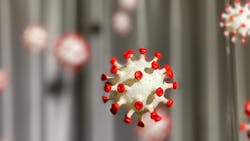A molecular study reveals how the mutations in the Delta and Kappa variants of SARS-CoV-2 help the variants avoid recognition by antibodies, according to a news release from the University of Washington.
The school said that most vaccine developers have concentrated on targeting the spike glycoprotein on the surface of the pandemic coronavirus. The spike glycoprotein comprises an N-terminal domain, that enhances cell binding, and a receptor binding domain that engages with the ACE2 receptor on host cells.
Most antibodies against SARS-CoV-2 latch onto specific sites on these two domains. Consequently, coronavirus variants have mutated their N-terminal domain and receptor binding domain to evade these antibodies, as is the case for the Delta and Kappa variants.
The scientists obtained plasma samples from 37 individuals, ranging in age from 22 to 66, who had received either two doses of the Moderna or Pfizer/BioNtech, or one dose of the Janssen, COVID-19 vaccines. Their data demonstrated that the Delta, Kappa and Delta+ variants reduced virus neutralizing potency from vaccine-induced antibodies. The Delta+ variant caused the greatest decrease. Antibodies from half of the Janssen-vaccinated individuals completely lost the ability to neutralize one or more variants in the laboratory assay.
The researchers went on to use cryoelectronmicroscopy to closely examine the structures of the main infectivity structure in the variant coronaviruses. They wanted to understand how the variant mutations lowered sensitivity to antibodies. The Delta variant came up with a unique molecular solution, including what the researchers described as “a striking remodeling of the N-terminal domain” which underscores its plasticity in dodging antibodies aimed at it.
One antibody, called S2X303, stood out because of its skill in cross-reacting with several variants, compared to all other neutralizing antibodies. By exploring how this antibody bound to the N-terminal domain, the scientists got a clearer picture of how it attacks its target. The antibody takes an unusual angle of approach to make a unique contact footprint within the N-terminal domain.
Despite the tendency of viruses to overcome immune defenses and resist treatment, there is some hope on the horizon. S309, the parent of a COVID-19 antibody that has received FDA emergency use authorization, so far has not had its effectiveness diminished by genetic changes in the pandemic coronavirus. It works by recognizing a part of the receptor binding domain that does not change. There has also been recent discovery of other antibodies that can recognize parts of the receptor binding domain that remain conserved in several species and strains of sarbecovirus. These finding might lead to the clinical development of more antibodies for the prevention and treatment of COVID-19.

